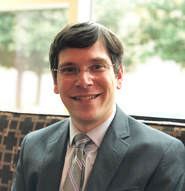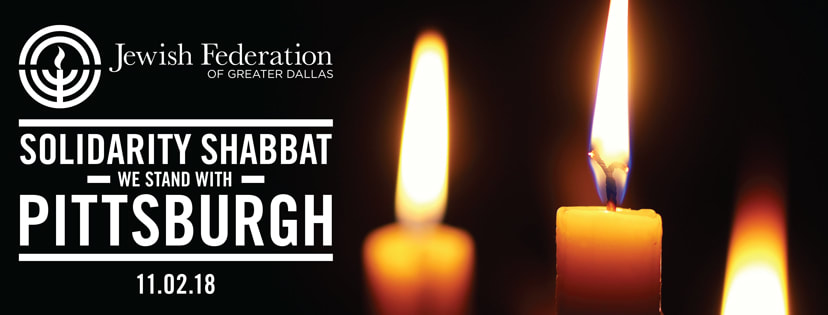 by Rabbi Adam Roffman When I found myself arm in arm with Shira, walking down the hallways of Levine Academy earlier this week after dropping Hannah off for school, suddenly struggling to stifle my sobbing, I realized that this is the kind of grief that gets worse before it gets better. And before the day was over, I understood why. I was stunned on Shabbat morning by the news of the shooting at Tree of Life in Pittsburgh. On Sunday evening, I was uplifted by the rush and emotion of the remarkably diverse gathering in the Aaron Family Sanctuary. And on Monday morning, once the details of a mass murder like this that we all seem to seek out, despite their horrific nature, had made their way into the daily papers, I was newly devastated. Come join us Friday evening at 6 pm in Beck Family Sanctuary. Across North America, at synagogues, community centers and homes, we will gather in prayer, compassion and unity — as one people. From Dallas to Denver. Toronto to Tampa and in every city and in between, we stand as a reminder of the power of community.But for those of us who attend services every Shabbat morning, it wasn’t until the list of names and ages of the dead were published and the stories of their lives told that such an unreal and unthinkable tragedy became as real as I pray it ever does. Benjamin Epstein, the son of our gabbai rishon, Leonard Epstein, who grew up davening with his family each Shabbat and Festival morning at Shearith, put it best: “Here's another reason [why] it’s personal. The shooting happened at approximately 9:55 am at a synagogue where services start at 9:45 am. You know who’s at shul within the first 10 minutes, even at the biggest of shuls? The rabbi. The gabbaim (and their kids), who are there to make sure everything is set, and the Torah is rolled. The chazzan, if your shul has one. And maybe 10-20 other people at most, a small but crucial dedicated core of the community. I can tell you the names of 11 of the first people to show up on Shabbat morning at CBI Berkeley, or at Congregation Netivot Shalom. If you go to a synagogue regularly, there's a good chance you know those people - you know who they are, even if you don't know them personally as well. Their presence is often not flashy, but they are vital to the stability and continuity of the shul and the service. That's who these people were.” After Leonard and I read Benjamin’s words on Facebook, we came to the same conclusion: We never met any of the victims, but that doesn’t mean we didn’t know them. In fact, as I went down the list of the minyan plus one of Jews whose blood was spilled on pews and prayer books, it hit me that not only do I know these eleven people, I see them every week. Bernice and Sylvan Simon z”l, 84 and 86. Of the first to arrive each Shabbat morning at Shearith, in time to help others say kaddish, is a married couple, only 77 and 81 years young. Rose Mallinger z”l, 97. A few weeks ago, we celebrated the birthday of our most senior Shabbat regular. He just turned 97. Melvin Wax z”l, 88. Described as a “pillar” of his congregation, he was at the bimah chanting the first part of the service, which, in our shul, is regularly led by a man who is often called a “pillar” of the Dallas Jewish community, 90. David and Cecil Rosenthal z”l, 54 and 59 Why did they lose their lives in the massacre, while other members of the congregation managed to escape? Because, like one of our gabbayim, 60, they always stood at the entrance of the sanctuary to welcome each person into the room with a smile and a handshake. Their open hearts made them an open target. Today, we bade farewell to Moe Stein, a beloved figure at Shearith, the Federation (where he served as CEO), and countless other places in our Jewish community. But he didn’t show up every week at 9:30. That would have been sleeping in. No, he came at 8:30 so that he could participate in Torah Study. Moe was 92. “He killed our relative equivalent down to their 97-year-old,” Leonard wrote me. We know these people. These people were kind and warm and welcoming. These people were selfless and generous with their time, even if they knew it meant standing in the silence of a mostly empty room early in the morning. These people took seriously the responsibility of comforting each mourner and celebrating each new life in the company of ten Jews. These people weren’t just our kind of people. They are our people. For all these reasons, because they were among the first to arrive on what would turn out the be last of their many decades of Shabbat mornings in shul, because their menschlikeit and devotion to our tradition made them stand out, now, they stand no more. Who will stand with me in their place? Who will stand watch at the door to welcome friend and stranger alike? Who will join our Shabbat regulars (may they live to 120) with their punctual presence and demonstrate that we will not be intimidated, not be deterred from our sacred task, not be made to fear in our own House? Who will be there at 9:30 am on Shabbat morning this week, next week, once a month, once every few months, once a year to defeat a man who believed he could defeat us with bloodshed and hatred? Because after Pittsburgh, showing up at shul on time is not just a mitzvah, it’s also an act of defiance.  Come join us Friday evening at 6 pm in Beck Family Sanctuary.
Across North America, at synagogues, community centers and homes, we will gather in prayer, compassion and unity — as one people. From Dallas to Denver. Toronto to Tampa and in every city and in between, we stand as a reminder of the power of community.
1 Comment
|
Details
AuthorsShearith Israel clergy, staff and congregants share Archives
April 2023
Categories
All
|

 RSS Feed
RSS Feed